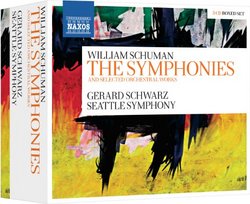The Symphonies of William Schuman on Naxos
Robin Friedman | Washington, D.C. United States | 08/03/2010
(5 out of 5 stars)
"In celebration of the 100th anniversary of the birth of the American composer William Schuman (1910 -- 1992), the budget priced Naxos label has released this 5 CD set of the composer's eight symphonies together with several other orchestral works. (The symphonies are numbered 3 -- 10 because Schuman withdrew his first two efforts in the form.) Gerard Schwarz, long a champion of Schuman and of American music conducts the Seattle Symphony in these recordings which range in date from 1991 through 2008. The recordings originally were released as individual CDs from 2005 -- 2010. Naxos has done a service by compiling this set to allow listeners to explore the breadth of Schuman's symphonic accomplishment. Joseph Polisi, the president of the Juilliard School of Music and the author of a biography of Schuman, "American Muse" American Muse: The Life and Times of William Schuman (Amadeus) has written detailed program notes for the compilation.
Schuman's earliest musical interest was in jazz, and he did not decide to devote himself to becoming a composer until the age of 20. In a productive life, Schuman combined his calling as a composer with a career as an administrator. Among other things, he served as the director of publications for G. Schirmer, president of the Juilliard School, and president of the Lincoln Center. His goal in his educational and administrative activites was to make business and academia more receptive to the needs of creative musicians. It is as a composer, however, that Schuman wished to be remembered.
Schuman's eight symphonies date from between 1941 and 1976. Some of the symphonies, such as nos 3, 5, and 7, have been recorded frequently by conductors including Leonard Bernstein and Eugene Ormandy. Other have been performed and recorded only rarely. Since his death, Schuman has received only sporadic attention. His symphonies as a group constitute a major accomplishment. This set may bring them the attention they deserve.
Schuman changed as a symphonist over time, but listening to this set shows that his works have some common characteristics. The symphonies make heavy use of counterpoint. They are strongly rhythmic and have a distinctive orchestration which makes great use of brass and percussion. Themes in each work tend to be tightly integrated. The musical language tends to become progressively more dissonant and dense, but it always remains tonal. Most importantly, the symphonies are clearly the work of an American composer in their brashness, boldness and basic optimism.
The symphony no. 3, composed in 1941, remains Schuman's best-known and most accessible symphony. It is in two movements, each of which is in two parts, named after baroque, rather than classical forms: a Passacaglia and Fuigue and a Chorale and Tocatta. The symphony no. 5 called the "Symphony for Strings" composed in 1943 is also a well-known, simpler work, which also features detailed counterpoint and a lovely slow movement. The symphony no 4, dating from 1942, is an optimistic lyrical work composed during the difficult early days of WW II.
The next 4 symphonies, nos. 6 -- 9 are denser, more difficult works. The symphony no. 7 (1970), consisting of four large interconnected movements is the best-known of these works, but I think the best of them is the massive, large scale symphony no. 8 composed in 1962. It is a somber, intense composition. The rarely heard Symphony no. 6 (1949), is a single movement granitic work full of counterpoint and shifting perspectives that gradually grew on me. The ninth symphony "le fosse adreatine (1967), is difficult music which commemorates a Nazi atrocity at the Adreantine Caves in 1944. It is a meditative work which moves to a prayer for forgiveness. Schuman's final symphony, the "American Muse" was composed for the National Symphony Orchestra in 1976 in celebration of the bicentennial. It is an optimistic, brassy work which seems to me to revert to an earlier style of the composer.
In addition to the symphonies, this compilation includes a variety of Schuman's shorter orchestral compositions, including his famous "New England Triptich: Three Pieces for Orchestra after William Billings" (1956) and his arrangement of Charles Ives's "Variations on America" (1964). These two works are Schuman's most familiar compositions. I enjoyed more hearing hearing lesser known works such as Schuman's ballet "Judith" (1949),the patriotic "Prayer in a Time of War" (1943) and the dance poem "Night Journey for fifteen Instruments" (1947) composed, as was "Judith" for Martha Graham. Several short accessible works round out the set.
I enjoyed hearing these symphonies on the individual CDs and revisiting them in this compilation. I hope this set will encourage listeners to explore Schuman's music and other music by deserving American composers. For readers wanting to read various reviewer comments on the individual CDs in the series, I am attaching links below.
William Schuman: Symphonies Nos. 3 & 5
William Schuman: Symphonies Nos. 4 and 9; Orchestra Song; Circus Overture
William Schuman: Symphonies Nos. 7 and 10
William Schuman: Symphony No. 6; Prayer In Time
Schuman: Symphony No. 8 - Night Journey; Variations on 'America'
Robin Friedman
"

